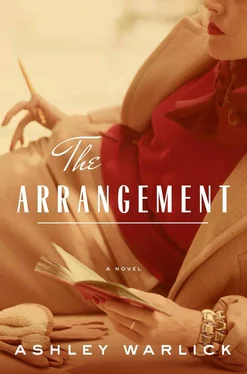“Cut over the lawn,” she said. “You don’t want to miss your train.”
* * *
When she got home, the Hudson was gone. Gigi’s door was ajar: on the nightstand, a cup of coffee and the newspaper collected from the front porch. The sheet was low on Gigi’s back, so slight Mary Frances could trace the basket of her ribs, a long scar, thin and red as a whip of candy, disappearing over the arch of her hip. Mary Frances had seen Gigi in bathing suits and harem costumes and had never seen this scar. She wondered how hard she had to work to keep it covered.
Tim would have known every curve of it, of course. In a strange translation of time and space, Mary Frances knew that the time Tim had taken with her body the night they’d spent together was his habit, was what he gave Gigi as a matter of course, and she stuttered there at the door. To have that all the time. To walk away from it for something else. Or maybe every person met another on their own fresh terms, and what happened between her and Tim had never happened before. She couldn’t say, and she was surprised by how little she cared.
In the studio, Al’s manuscript was still stacked beside the typewriter, his clean paper, a fine film of dust collected there, and the paintings stacked against the walls, like children made to face the corner. She trailed her fingers along the top edge of the canvases smeared with red and ochre, tipping one back against her leg: a flurry of shapes and colors. Another, and another: they were all bright, dodgy, difficult to understand upside down and backward.
Tim had never showed her this work. There were paintings he’d made all over the house, landscapes and portraits and studies of small objects, paintings his cousin had made of Tim and his sister when they were children that you could now buy on greeting cards, and none of them were like this. She pulled out a canvas and hung it on a tenpenny nail across from the worktable.
It seemed to be a view through a scrim, the wavery aspect of water. She had the feeling her eyes were adjusting to the light in the room; which room exactly she could not say, the studio or the space in the painting, but after a while, a man’s face appeared, angular and strong, a bright stain of rouge or red on his cheek, as though he’d been kissed there and rubbed it away, as though he’d been slapped.
She pulled out a stool and sat down, cranked a clean page into the typewriter, and opened her notebook.
Lucullus placed a live fish in a glass jar in front of every diner at his table. The better the death, the better the meal would taste.
Catherine de Medici brought her cooks to France when she married, and those cooks brought sherbet and custard and cream puffs, artichokes and onion soup, and the idea of roasting birds with oranges. As well as cooks, she brought embroidery and handkerchiefs, perfumes and lingerie, silverware and glassware and the idea that gathering around a table was something to be done thoughtfully. In essence, she brought being French to France.
Everything started somewhere else. She thought of Tim’s note: write to me . He didn’t want to hear about Lucullus and Catherine de Medici; but she loved her old tomes and the things unearthed there, the ballast they lent, the safety of information. She spread her notebooks open across the table. There was a recipe for roasted locusts from ancient Egypt, and on the facing page, her own memory of the first thing she ever cooked, the curry sauce and Anne’s chocolate. A conversation rising between the two, her own voice at the center of it all.
It was hours later when Gigi knocked on the studio door.
“I’m late,” she said. “Did Al get off all right?”
Mary Frances turned on her stool. Gigi wore an ivory coat that gathered and buttoned at the waist, a pert hat pushed forward over her sleek curls, and Mary Frances wanted to excuse her same white blouse, her same blue skirt and oxfords. But Gigi was staring at Tim’s painting.
“I didn’t know he kept that,” she said, her expression skipping like a record.
“There are stacks of them.”
Gigi tried to make a sentence several times, her pretty mouth discarding the words before they’d begun. Finally, she turned to Mary Frances.
“You know that’s a picture of him.”
Mary Frances looked at the painting again.
“He had a collection of mirrors — old mercury glass ones, cracked ones, some that were ruined with age. He used the mirrors. Sometimes we’d have to stop—”
“It’s just nice to have something to look at.”
Gigi let her gaze settle on Mary Frances.
“He used to let me help, give me little chores around his studio,” she said finally. “He was always very good at making you feel important.”
“He’s probably still good at those things.”
She laughed. “Of course. That’s not what I was saying. Only that I’m familiar with his methods.” She gestured at the typewriter.
Mary Frances turned back to the page she’d written. She felt exposed the way she had playing cards, Gigi passing her Tim’s letter like contraband. She thought of the pale fish twisting in the jar, and she listened to Gigi walk away.
* * *
Without Al, Mary Frances discovered what she did alone. She liked to cook for herself, to assemble a meal of things he would never consider worth a mealtime — shad roe and toast, soft-set eggs, hearts of celery and palm with a quick yellow mayonnaise, a glass of wine, an open book in her lap, and the radio on. The elements that mattered most were the simple ones: butter, salt, a thick plate of white china and a delicate glass, the music faint, the feel of paper in her hand, and the knowledge that there was more, always more book to read, more wine if she liked it, some cold fruit in the refrigerator when she was hungry again, and the hours upon hours to satisfy herself.
She wrote. She wrote when she got up in the morning, straight on the typewriter or with her notebook in her lap, a cigarette lit but unsmoked, coffee poured but turning cold. She wrote while she did the breakfast dishes, while she swept the kitchen floor or hung the laundry, while she unpacked the refrigerator, wrapping everything in wet newspaper to keep it cold while the freezer box dripped into a mop bucket inside the open door. She wrote mostly when she was not writing; she wrote mostly when she looked as if she were doing something else, and then she typed late into the night in Tim’s studio to have another manuscript to send to him, another way to keep their conversation going.
She stayed out of Gigi’s way. Her friends came to the house, other chorus girls and actresses, all of them as young as she was, slender as switches, their hair every shade of blond imaginable. They passed around eyelash curlers and lipstick, cinched and beaded dresses, draped their clothes around the living room as though it were a costume closet: somebody had a date and needed a sweater, a skirt, a pair of stockings without runs, it came off another girl’s body, as if one were as good as another. Mary Frances lingered in the kitchen just to listen to them talk.
The talk was constant, wrapped in nudge and insinuation. This director was easy, this one hard, the production code would be the death of all of them. Roles were being cut because of it: embraces that lasted too long, hips that shimmied too long, the moll to the devil who didn’t get his due, and suddenly movies they thought they were playing in belonged to someone who’d kept their sunnier side up. One girl, Nan, was sad there would be no more kissing.
“Not the way there used to be kissing, at least. You know, like kissing so that maybe you got a date later.”
“No more bad girls.” Doris’s voice was whiskey-burned, and she liked to take the dim view. “No revenge in modern times. I mean, just think about that. What kind of stories are you going to tell without revenge?”
Читать дальше












